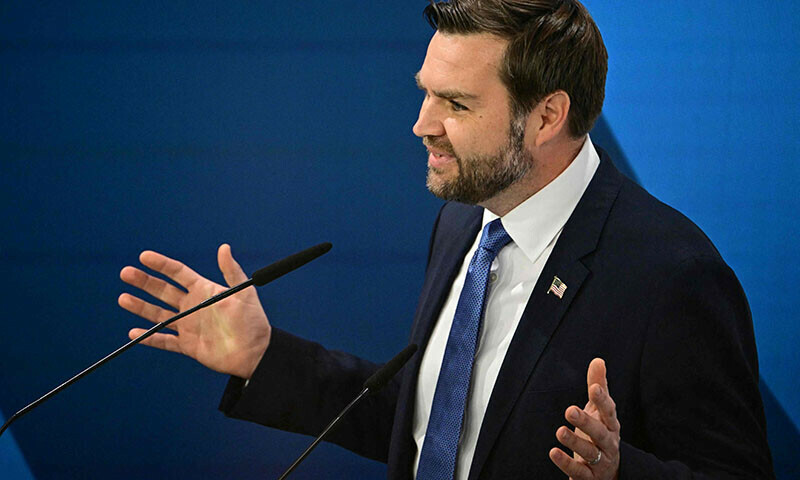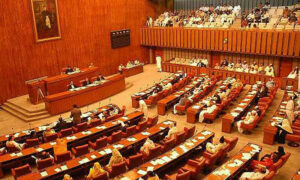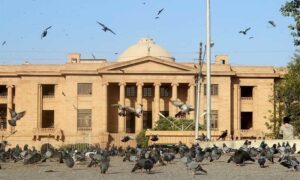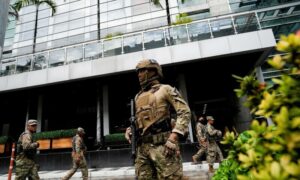US Vice President JD Vance said on Friday that Washington would be able to wield economic and military leverage in talks with Russia to ensure a good peace deal over Ukraine, but his spokesman later denied he was making any threats against Moscow.
Vance also urged Europe to spend more on defence in remarks before arriving for the Munich Security Conference, a major annual gathering of political leaders, military officers and diplomats.
In his keynote address to the conference, Vance lambasted the European Union for its regulation of hate speech and misinformation, which he said amounted to censorship.
He only briefly referred to Ukraine, saying he hoped a “reasonable settlement” could be reached.
However, Ukraine, and prospects for peace talks, preoccupied many at the high-profile global gathering after Donald Trump startled US allies by calling Russian President Vladimir Putin and announcing the start of talks to end the war in Ukraine.
Vance, who was due to meet Ukrainian President Volodymyr Zelensky later on Friday, said in an interview with The Wall Street Journal before the conference that Trump could use several tools — economic and military — for leverage with Putin.
Vance’s spokesman William Martin said later on X that Vance “didn’t make any threats. He simply stated the fact that no one is going to take options away from President Trump as these negotiations begin.”
Martin published what he said was a transcript from the interview, according to which Vance was asked what implicit threat and pressure Washington was considering towards Putin. He said Vance responded that “the range of options is extremely broad, and there are economic tools of leverage. There, of course, military tools of leverage [too].”
Vance mentioned none of this in his speech to the conference, instead focusing on criticising the 27-nation EU’s policy towards hate speech.
“The threat I worry the most about vis-a-vis Europe is not Russia, it’s not China, it’s not any other external actor,” he said, adding that it was what he called a retreat from fundamental values of protecting free speech — as well as immigration, which he said was “out of control” in Europe.
A Reuters reporter in one of the side rooms where more delegates could listen to Vance said people watched in stunned silence, with no applause.
European fear of exclusion from Ukraine deal
The Kremlin had said earlier on Friday that it hoped the US would clarify Vance’s remarks to the Wall Street Journal. “We have not heard such formulations before,” Kremlin spokesperson Dmitry Peskov told reporters.
US Treasury Secretary Scott Bessent echoed Vance’s comments. “Just like with the tariffs, it will depend on how President Putin comes to the table,” he told Fox Business Network.
“If we believe that taking the sanctions regime up to a maximum threshold level will help us achieve negotiating leverage — and as you know, no one understands negotiating leverage better than President Trump, so — that will be his decision, and Treasury will implement it.”
Trump’s phone call with Putin stoked fears among European governments that they might be frozen out of a settlement to end the Ukraine war that could wind up being too favourable to Russia and undermine European security as a whole.
German Foreign Minister Annalena Baerbock reiterated those concerns on Friday. “A sham peace — over the heads of Ukrainians and Europeans – would gain nothing,” she said. “A sham peace would not bring lasting security, neither for the people in Ukraine nor for us in Europe or the United States.”
Germany’s defence minister said it was a mistake for Trump to take the bargaining chips off the table, namely Ukraine’s wish for Nato membership and its objective to recover all territories taken by Russian forces since 2014.
Russia now holds about 20 per cent of Ukraine nearly three years after launching a full-scale invasion, saying Kyiv’s pursuit of Nato membership posed an existential threat. Ukraine and the West call Russia’s action an imperialist land grab.
Pressure on Europe
Vance also repeated Trump’s demand that Europe do more to safeguard its own defence so Washington can focus on other regions, particularly the Indo-Pacific.
“In the future, we think Europe is going to have to take a bigger role in its own security,” he said in a bilateral meeting with German President Frank-Walter Steinmeier.
Nato Secretary General Mark Rutte said Vance was “absolutely right” about the need for Europe “stepping up” and doing more for its own defence. “We have to grow up in that sense and spend much more,” Rutte said.
At the conference, several European leaders echoed his comments, saying Europe would step up its defence spending but also needed to discuss a gradual phasing-out of its support with Washington.
As a senator, Vance expressed blunt scepticism about US support for Ukraine. Speaking on a podcast in 2022, he said: “I don’t really care what happens in Ukraine one way or the other.”
Saudi Arabia welcomes Putin-Trump meeting
Separately, Saudi Arabia said that it commended the phone call between Trump and Putin, welcoming the idea of their meeting in the kingdom.
Peskov said it could take several months to arrange a meeting between Putin and Trump, possibly in the Saudi capital Riyadh.
Saudi Crown Prince Mohammed bin Salman was the first foreign leader Trump called after taking office. He described the crown prince as “a fantastic guy” during his speech via video link to an audience at the World Economic Forum in Davos.
Putin, who visited Saudi Arabia and the UAE in 2023, said last September that he was grateful to Mohammed bin Salman for helping to organise the biggest US-Russian prisoner swap since the Cold War.
Russian drone hits Chernobyl cover
Earlier today, Zelensky said that a Russian drone had struck the cover built to contain radiation at the Chernobyl nuclear power plant, adding that radiation levels were normal.
The Ukrainian air force said that Russia had launched 133 drones across the country overnight — including attack drones — targeting northern regions of the country where the Chernobyl power plant lies.
“Last night, a Russian attack drone with a high-explosive warhead struck the cover protecting the world from radiation at the destroyed 4th power unit of the Chernobyl Nuclear Power Plant,” Zelensky said in a social media post.
The attack is evidence that Russian President Vladimir Putin is “definitely not preparing for negotiations — he is preparing to continue deceiving the world”, Zelensky said.
CCTV footage posted by the Ukrainian leader showed a blast on the side of the Chernobyl structure in footage that was timestamped 02:02am.
The Kremlin rejected that its army targeted Ukrainian nuclear structures.
“There is no question of any strikes on such nuclear infrastructure sites. Any claims that this was the case do not correspond to reality. The Russian military does not do this,” Kremlin spokesman Dmitry Peskov said today after stating that he did not have “exact information” about the reported hit on Chernobyl.
Zelensky’s video also showed a small fire and a hole in the roof, and firefighters using a hose to put out the blaze from the inside of the dome. He said the drone had flown at an altitude of 85 metres, too low to be detected by radar.
The International Atomic Energy Agency (IAEA) also reported an “explosion” at the site, and said “radiation levels inside and outside remain normal and stable.”
The agency, which has had a team deployed at Chernobyl since the early stages of Russia’s invasion of Ukraine, published images apparently showing the drone on fire after crashing into the covering.
The IAEA has repeatedly warned of the dangers of fighting around nuclear plants following Russia’s full-scale military offensive into Ukraine in February 2022.
Russia responded by calling Zelensky’s accusation a staged “provocation” by Kyiv to blackmail the West into giving it more aid.
Maria Zakharova, a spokesperson for the Russian Foreign Ministry, accused Zelensky of orchestrating the alleged drone attack to coincide with the Munich event as part of a lobbying effort to secure more weapons and money from the West.
“There was never any doubt that Zelenskiy would not come to the Munich conference empty-handed. The hands of the Kyiv regime must always be busy with some children’s rattles to distract the attention of the conference participants.
“Zelensky travels with performances that are backed up by provocations,” Zakharova told a news briefing in Moscow. “Is there any doubt in anyone’s mind that this is a provocation? There can be no doubt. A performance was needed to lobby for arms deliveries and convince the world public. A scary, bloody and very dangerous performance,” she said, accusing Kyiv of using nuclear plants for “blackmail”.
In the first days of the conflict, Russian forces briefly seized the Chernobyl plant and also captured the Zaporizhzhia nuclear plant in southern Ukraine, which it still controls.
In 1986, a reactor at Chernobyl exploded during a botched safety test, resulting in the world’s worst nuclear accident that sent clouds of radiation across much of Europe and forced tens of thousands of people to evacuate.
Soviet authorities initially tried to cover up and then play down the disaster.
In November 2016, a massive metal dome was erected over the remains of the reactor — paid for with €2.1 billion euros ($2.5bn) in international funding — to stop future leaks.
“The only country in the world that attacks such sites, occupies nuclear power plants, and wages war without any regard for the consequences is today’s Russia,” Zelensky added in his statement.
The Ukrainian energy ministry meanwhile “called on the IAEA to intensify efforts to prevent hostile attacks on nuclear facilities”.
Russian drone and missile attacks on energy facilities throughout the conflict have crippled Ukrainian electricity generation capacity and forced routine and widespread power outages.
- Desk Reporthttps://foresightmags.com/author/admin/










